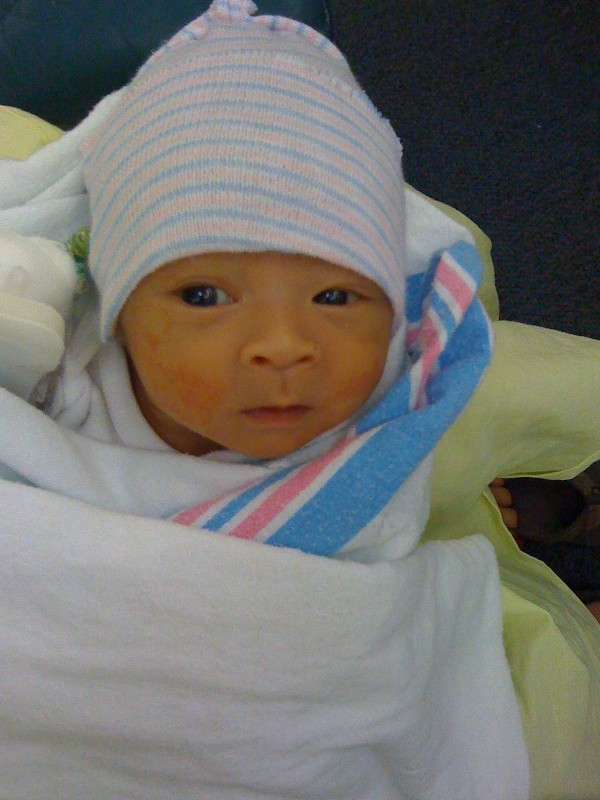Isaac is a happy and inquisitive 13-year-old. His current hobbies are playing tennis and practicing his karate moves. He loves learning new things, and he is not one to shy away from challenges.
“Isaac is goal-oriented,” said his mother, Tu-Lan Tran. “He is doing well academically and loves history and the military. Isaac achieves whatever he sets his mind to. The sky is the limit for him.”
For the Trans, seeing their son succeed is not something they take for granted.

“My OB/GYN saw calcifications in his GI tract, and he had a single kidney,” said Tu-Lan. “No other issues were detected from the ultrasound at that point. I began seeing a maternal-fetal medicine (MFM) doctor to monitor my pregnancy more closely. It wasn’t until after Isaac was born that we learned our son had more health complications. Everything seemed to happen one after another.”
Isaac was born with imperforate anus, a rare birth defect where there is no anus (opening) at the end of his digestive tract. Isaac also had a neurogenic bladder, a term that describes what happens when neurological conditions affect the way the bladder functions. He had surgery to reconstruct his anus and then another surgery to correct an abnormal connection between his urethra and bowel. Additionally, Isaac had sacral agenesis, where his lower spine didn’t develop normally. When he was 6 years old, he was diagnosed with a tethered spinal cord. Over time, this condition can affect spinal mobility and cause bladder and bowel control problems, which Isaac experienced.
“It’s been quite a journey for Isaac,” said Tu-Lan. “He’s had several surgeries during the first six years of his life. He is doing well, and we are thankful to his doctors for taking great care of him.”
Our Comprehensive Congenital Colorectal Program
For patients like Isaac who are living with a congenital colorectal disorder, having providers with expertise in specific pediatric conditions can make a big difference in treatment and quality of life. Isaac’s follow-up care is managed through the Comprehensive Congenital Colorectal Program.
The Program helps patients who are born with conditions that affect the anatomy or function of the colon, rectum and pelvic floor. Kidney, bladder, genital and spine disorders can occur along with congenital colorectal disorders. In affiliation with McGovern Medical School at UTHealth Houston, physicians from multiple specialties provide care to patients with congenital colorectal disorders and the associated conditions that begin at birth and continue throughout adulthood. The care team involved in this comprehensive program provide seamless coordination between different medical specialties to deliver the most appropriate treatment options. Surgical and nonsurgical procedures are provided at UT Physicians clinics or at Children’s Memorial Hermann Hospital in the Texas Medical Center or Memorial Hermann Katy Hospital.
“Many patients have difficulty finding providers who fully understand their condition and associated disorders, and who can provide the treatment and long-term management of their disorders,” said Akemi Kawaguchi, MD, director of the Comprehensive Congenital Colorectal Program, associate professor of pediatric surgery at UTHealth Houston and pediatric surgeon affiliated with Children’s Memorial Hermann Hospital. “While patients can have surgery to correct disorders as infants, many continue to have symptoms throughout their life. Our affiliated team takes a comprehensive and streamlined approach to provide care for children and adults with congenital colorectal disorders.”
To manage Isaac’s fecal incontinence and constipation, Dr. Kawaguchi started him on a bowel regimen program that consisted of enemas his parents administered to him daily. But to make the enema process easier for Isaac, he had an appendicostomy when he was 9 years old. Prior to his bowel management program, Isaac was not eating well, and he had to limit his activities due to his accidents. After his intestines were working better, he grew quickly and gained weight.
“We laparoscopically connected the appendix to his belly button, creating an alternate way to deliver enemas through a hidden opening in the belly button instead of the anus,” said Dr. Kawaguchi. “This made the enema process easier for Isaac by giving him the independence to administer his own enemas and to effectively treat his incontinence and severe constipation.”
Once his colorectal problems were treated, Isaac’s bladder function also began to improve.
As part of Isaac’s follow-up care, Lawrence Cisek, MD, PhD, professor at UTHealth Houston and a pediatric urologist affiliated with Children’s Memorial Hermann Hospital, monitors Isaac’s single right kidney closely and evaluates him for any signs of urinary tract infections (UTIs) or other urinary conditions that may require immediate care.
“UTIs are common among patients with neurogenic bladder dysfunction,” said Dr. Cisek. “Since Isaac only has one kidney, we check on kidney function during his follow-ups to make sure he doesn’t have problems with swelling or backing up of urine in his kidney. Since his bladder does not empty as efficiently as it should, Isaac follows scheduled intervals for urination to help his bladder adapt to a regular cycle for emptying. This hygiene practice has benefited him a lot.”
Isaac goes to the clinic once a year for follow-up visits since he is doing remarkably well. His ongoing care for bowel and bladder management have helped Isaac live a socially confident life.
“Isaac is a great example of how we can provide comprehensive care for patients with colorectal anomalies who also have associated urologic or neurosurgical challenges so they can enjoy the best possible quality of life,” said Dr. Kawaguchi. “It’s very fulfilling to see our patients thrive.”
For Isaac to be where he is today, is no small feat. He had a rough start after his birth.
A Challenging Start

The NICU at Children’s Memorial Hermann Hospital has118 beds and is classified as a Level IV NICU by the Texas Department of State Health Services (DSHS)—the highest level of care available for premature and critically ill newborns.
“Isaac was doing fine after the delivery,” said Tu-Lan. “There weren’t any concerns expressed to me until a few minutes later. The NICU physician came into my room, and he told us that Isaac had imperforate anus. They discovered the birth defect after completing a physical assessment on him.”
Within 48 hours after Isaac was born, he had a colostomy, a surgical procedure where the end of the colon is brought through an opening (stoma) created in the abdominal wall. The stool passes through the stoma and into a pouch attached to the abdomen. The colostomy was a temporary repair to allow time for Isaac’s colon to heal before other corrective surgery could be performed.
While recovering in the NICU, Isaac’s care team noticed his colostomy bag kept filling up with more fluid. After conducting an imaging study using contrast dye, they discovered Isaac had a colovesical fistula. Since Isaac’s bowel was connected to his urinary system, his pediatric surgeon removed the fistula and sutured the bladder wall to separate the abnormal connection between the two systems.
“Isaac did well after surgery, but then doctors noticed he had nerve issues causing his bladder and bowel incontinence,” said Tu-Lan. “After running some tests on his nervous system and his bladder function, they discovered Isaac had a neurogenic bladder.”
Neurogenic bladder refers to a number of urinary conditions in children who lack normal bladder control due to a brain, spinal cord or nerve problem. In a normal bladder, nerves carry messages between the bladder and the spinal cord and brain. The messages tell the muscles of the bladder to either tighten or release. In neurogenic bladder, these nerve cells cannot communicate with each other.
After two-and-a-half weeks in the NICU, the Trans were able to bring their son home. “It was the best feeling in the world when we finally brought Isaac home,” said Tu-Lan. “Prior to his discharge, there were certain things we learned to do in order to care for Isaac’s medical needs at home. He came home with a colostomy bag, so emptying it became part of our routine with him.”
Isaac’s Reconstructive Surgery
Isaac wore a colostomy bag until he was 6 months old. Once his colon healed, he had his second surgery at Children’s Memorial Hermann Hospital. In May 2010, an anoplasty was performed to reconstruct a permanent anus for Isaac. Then, a few weeks later, once his colon healed, Isaac had a colostomy reversal, a procedure to detach the colon from the abdominal wall and stoma and re-establish normal stool flow from the colon to the newly reconstructed anus.
“While we were glad Isaac had the surgery so he could be able to carry on a normal life, our son still struggled with bowel problems,” said Tu-Lan. “Isaac had constipation and he was incontinent at the same time. There were several times where his stool got impacted, and we had to take him to the hospital for disimpaction procedures where he had to be put under anesthesia. My husband and I administered enemas every day to help manage and alleviate Isaac’s constipation problems.”
As Isaac struggled with bowel and bladder problems, his doctors discovered the neurological connection that likely was responsible for all his symptoms, which seemed to be interrelated.
Getting to the Cause of the Problem
When Isaac was a year old, his surgeon noticed a small dimple on Isaac’s lower back and ordered an MRI. The results showed Isaac had a tethered spinal cord, an entity sometimes associated with imperforate anus. In Isaac’s particular situation, the tethering or stretching of the spinal cord was due to an abnormal piece of tissue that was preventing the spinal cord from being in its proper position. As a patient grows and becomes taller, there is a potential to develop weakness and sensory problems in the legs, bladder and bowel problems, and damage to the spinal cord.
The Trans were referred to Stephen Fletcher, DO, professor of pediatric neurosurgery at UTHealth Houston and pediatric neurosurgeon affiliated with Children’s Memorial Hermann Hospital.
Due to the tethered cord and changes in the spinal cord noted on the MRI, a recommendation was made to operate on Isaac and cut the abnormal tissue at the end of the spinal cord.
On June 17, 2016, 6-year-old Isaac underwent tethered spinal cord surgery. Dr. Fletcher and his team removed the tissues that prevented Isaac’s spinal cord from moving freely. After tethered cord release surgery, Isaac recovered for a few days in the hospital before he returned home.
A New Lease on Life
Now 13, Isaac is a very active teenager. Since his constipation has been managed successfully and his digestive tract is not bothering him anymore, he has a lot more energy and a healthy appetite.
“Isaac is living life to the fullest and isn’t letting anything hold him back,” said Tu-Lan. “We are incredibly blessed to have a wonderful team working together to help Isaac succeed.”
Learn about the Comprehensive Congenital Colorectal Program »